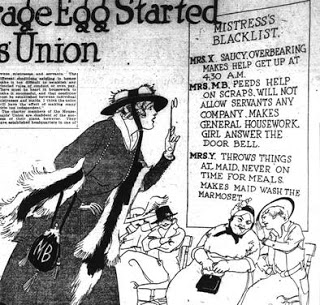Since I am about to resume work on my new book, Jane Street and the Housemaid Rebellion: Sex, Syndicalism, and Denver’s Capitol Hill, I am re-posting a blog from my Chasing Rabbits page at www.franklittleandtheiww.net. Later I will break down this title for readers. It sounds nasty, doesn’t it? I will say this, if the “Me, Too” Movement had been born almost 100 years ago, there would have been plenty of voices crying out. Instead, just a few whispers will bravely protest in my narrative. Treatment is not so equal between the sexes, even among those groups proclaiming such.
I recently discovered that my fifteen-year-old grandmother, whom I mention below, was married off to a man over twice her age after she was orphaned in 1913. Was this Danish custom? She later ran away to become a Boulder, Colorado, housemaid, seeking protection in a silver-baron’s mansion. Yet, Boulder and Denver mansions were not necessarily safe havens for female servants nor were many meeting places where these young women congregated. Jane Street finds this out, the hard way.

The blog:
A feisty young woman, for whatever reason, decided to organize domestic servants employed by Denver society women in the spring of 1916. Jane Street, not even a maid herself (despite what has been written), determined that a new union, under the umbrella of the Industrial Workers of the World, would better the lives of these women, many immigrant girls who had no other vocation or skills to support themselves. Jane’s cause likely aroused the ire of millionaire husbands who had to listen to their pampered wives’ complaints. Dealing with union workers in their gold and silver camps was one thing, but a labor conflict in their households was an entirely different animal. Imagine house maids blacklisting certain tyrannical mistresses!
Why did I chase this “rabbit”? For two reasons. The first is that my seventeen-year-old grandmother, Louise Peterson Little, was such a servant. Only she worked in a mansion in Boulder, Colorado, thirty miles north of Denver. The Boulder housemaids intently observed their sisters’ mutiny as the rebellion spread.
The second reason is because of Frank Little, my uncle. In researching Frank Little and the IWW, I discovered he not only sympathized with these women, but also helped Jane Street organize, supporting her at a time when male-dominated-union apathy, if not condescension, of women’s labor struggles undermined any real western labor organization. If fact, as this story plays out, certain male union members (not Frank!), under the guise of providing “fatherly direction” to the nascent liberation-de-la-femme uprising, determined that the new union headquarters, its rooms available for out-of-work maids, was their personal smorgasbord, enticing vulnerable girls for sexual favors. So, the house maids’ uprising is more than a melodrama—a thread of white slavery now entered my research. Enter the YWCA, whose members determined that housewives should “educate” the poor girls in gentility, education, and training; Denver’s Chamber of Commerce; a burglary of the union’s famous index card file; and a fascinating historical story emerges.
Jane Street is an attractive historical character herself. Beautiful, and bohemian as illustrated by her outlook on life and the musical talents she and her sister shared, she moved around the country, birthing three children by different fathers. Perhaps she discovered true love once she met a one-legged, world-renowned bicyclist named Charles Devlin. How Devlin’s story intertwines with Jane’s is remarkable, fraught with union organization, Thiel and Pinkerton spies, jealous lovers, and vengeful IWW leaders. Only after she was ensnared by Bureau of Investigation agents at the end of WWI does she disappear from the radical scene.
In feminist studies, Jane Street’s leadership of the Denver housemaids’ uprising is often mentioned. But her inclusion is just that—a mention—and no one has really told her story. But I will. Jane Street is the subject of my next book, and already the research of her story is captivating my musings.